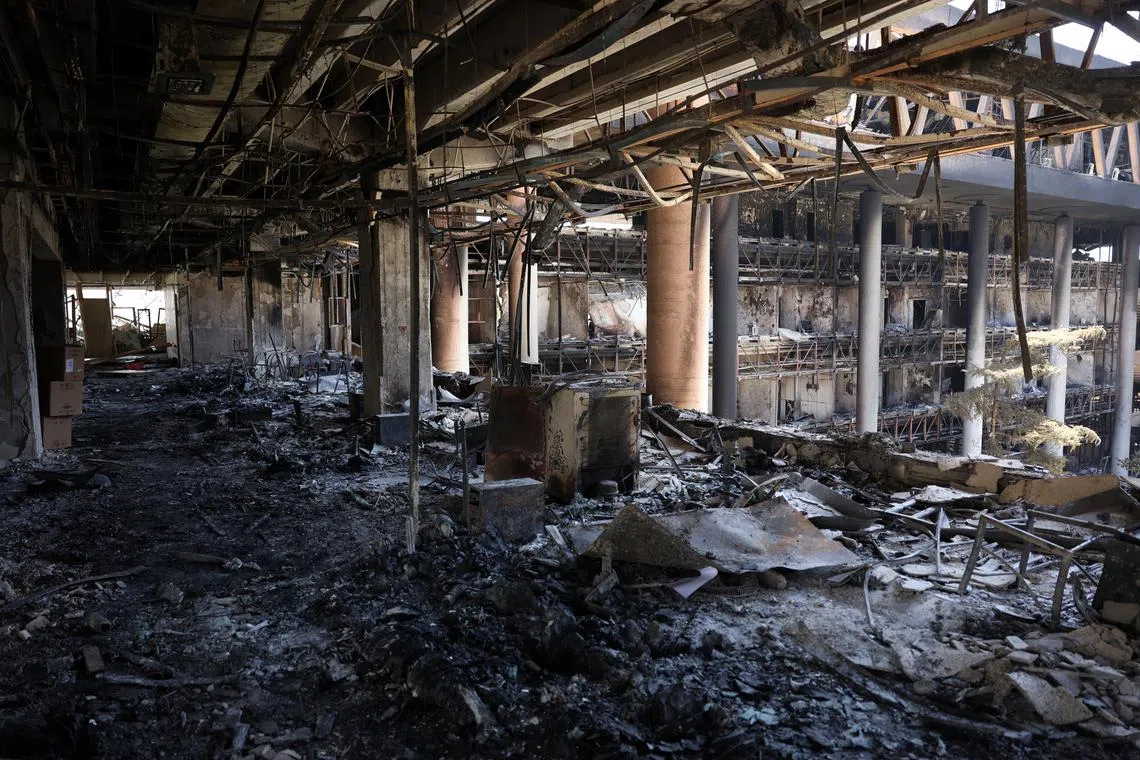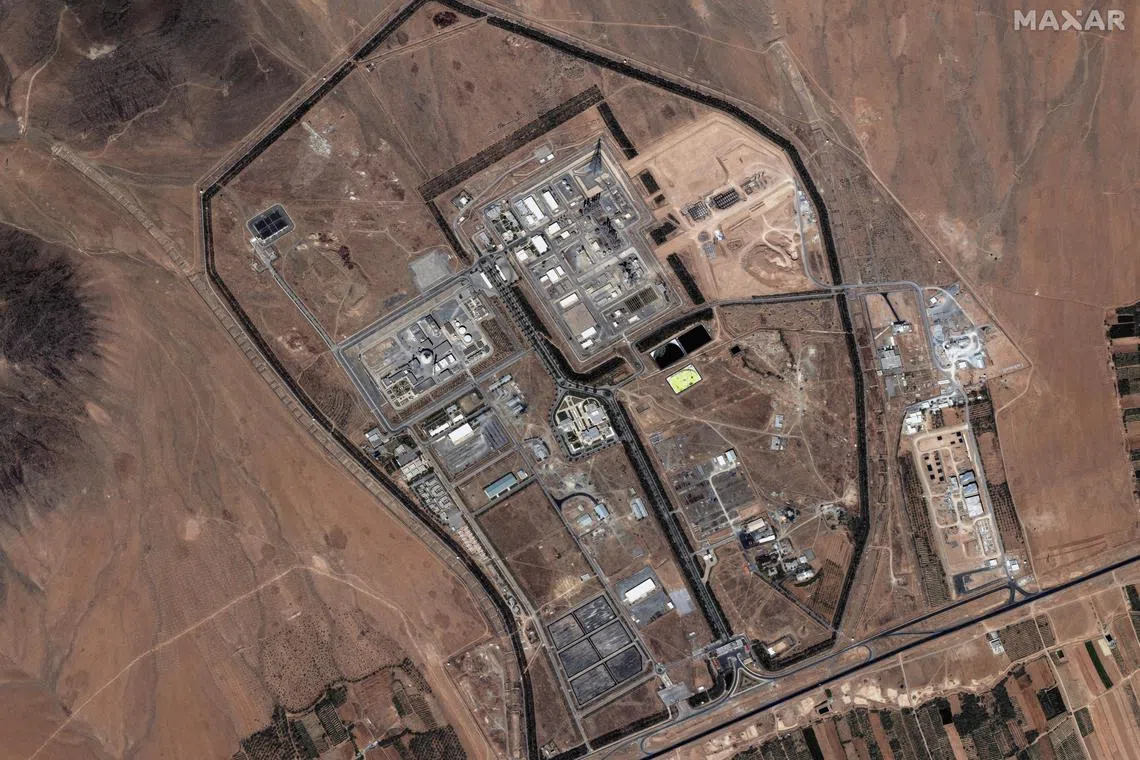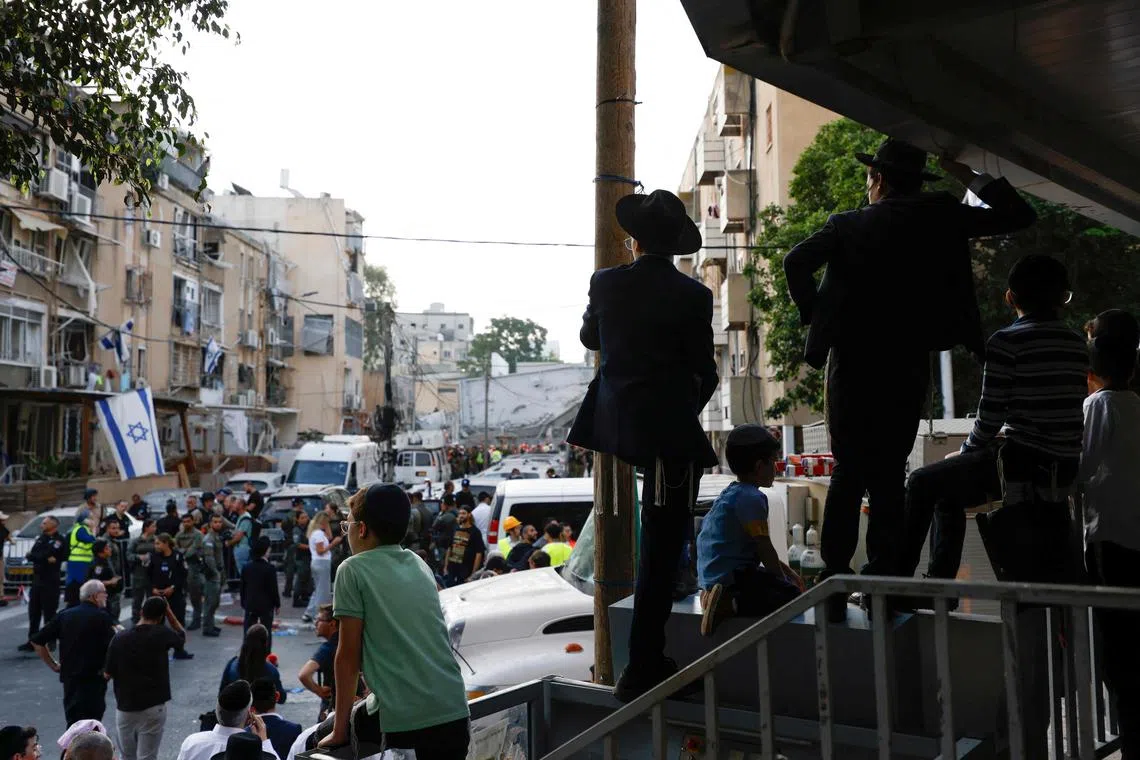Europe pushes diplomacy as Israel-Iran air war enters second week
Sign up now: Get ST's newsletters delivered to your inbox
Follow topic:
TEL AVIV/DUBAI/WASHINGTON – Iran said on June 20 it would not discuss the future of its nuclear programme while under Israeli attack, as Europe sought to draw Tehran back to the negotiating table, with a decision on potential US involvement expected within two weeks.
Israel began attacking Iran
Iran retaliated with missile and drone strikes on Israel. It says its nuclear programme is peaceful.
Israeli air attacks have killed 639 people in Iran, said the Human Rights Activists News Agency.
Those killed include the military’s top echelon and nuclear scientists. Israel has said at least two dozen Israeli civilians have died in Iranian missile attacks.
Reuters could not independently verify the death toll from either side.
Israel has targeted nuclear sites and missile capabilities, but also has sought to shatter the government of Supreme Leader Ali Khamenei, according to Western and regional officials.
“Are we targeting the downfall of the regime? That may be a result, but it’s up to the Iranian people to rise for their freedom,” Israeli Prime Minister Benjamin Netanyahu said on June 19.
Iranian Foreign Minister Abbas Araghchi said there was no room for negotiations with Israel’s superpower ally the United States, which he called a partner in crime, “until Israeli aggression stops”.
Iran has said it is targeting military and defence-related sites in Israel, but it has also hit a hospital and other civilian sites.
Israel accused Iran on June 19 of deliberately targeting civilians through the use of cluster munitions
Iran’s mission to the United Nations did not immediately respond to a request for comment.
Iran’s emergency services said on June 20 that five hospitals had been damaged in Israeli strikes.
With neither country backing down, the foreign ministers of Britain, France and Germany, along with the European Union foreign policy chief, were due to meet Mr Araghchi in Geneva to try to de-escalate the conflict on June 20.
“Now is the time to put a stop to the grave scenes in the Middle East and prevent a regional escalation that would benefit no one,” said British Foreign Minister David Lammy.

A damaged building of Iranian state broadcaster IRIB after an Israeli air strike in Tehran on June 19.
PHOTO: EPA-EFE
US Secretary of State Marco Rubio also met Mr Lammy on June 19 and held separate calls with his counterparts from Australia, France and Italy.
The US State Department said Mr Rubio and the foreign ministers agreed that “Iran can never develop or acquire a nuclear weapon”.
Mr Lammy said the same on X while adding that a “window now exists within the next two weeks to achieve a diplomatic solution”.
However, Mr Araghchi told Iranian state television on June 20 that Tehran would not agree to talks while Israeli strikes continued.
Russian President Vladimir Putin and Chinese President Xi Jinping both condemned Israel
The role of the United States, meanwhile, remained uncertain.
Mr Trump’s special envoy to the region, Mr Steve Witkoff, has spoken with Mr Araghchi several times since last week, sources say.
The White House said Mr Trump will take part in a national security meeting on the morning of June 20.
The President has alternated between threatening Tehran and urging it to resume nuclear talks that were suspended over the conflict.
Missile strikes
At dawn on June 20, the Israeli military issued a fresh warning of an incoming barrage of missiles from Iran.
At least one made a direct impact in Beersheba, Israel’s largest southern city, which has been targeted in recent days.
The missile struck near residential apartments, office buildings and industrial facilities, leaving a large crater and ripping off the facade of at least one apartment complex while damaging several others.
“We have a direct strike next to one of the buildings. The damage here is quite (extensive),” paramedic Shafir Botner said.
Israeli public broadcaster Kan aired footage showing cars engulfed in flames, thick plumes of smoke and shattered windows at apartment buildings.
At least six people had light injuries from the blast, according to Mr Botner, who said that first responders were still searching apartments for casualties.
On June 19, Iran hit a major hospital in Beersheba, Israel’s largest city in the south.
Iran said it was targeting Israeli military headquarters near the hospital, but Israel has denied there were any such facilities in the area.
Israel’s military also said it had carried out several overnight strikes in the heart of the Iranian capital.
The military said the targets included missile production sites and a facility for nuclear weapons research and development.
Israeli Foreign Minister Israel Katz warned of action against Iranian ally Hezbollah on June 20, a day after the Lebanese militant group suggested it would come to Iran’s aid.
Mr Trump has mused about striking Iran, possibly with a “bunker buster” bomb that could destroy nuclear sites built deep underground.
The White House said Mr Trump would decide in the next two weeks

A satellite image showing an inactive nuclear reactor in Arak, Iran, after a round of Israeli air strikes on June 19.
PHOTO: MAXAR TECHNOLOGIES/NYTIMES
That may not be a firm deadline. Mr Trump has commonly used “two weeks” as a timeframe for making decisions, and has allowed other economic and diplomatic deadlines to slide.
With the Islamic Republic facing one of its greatest external threats since the 1979 revolution, any direct challenge to its 46-year-long rule would most likely require some form of popular uprising.
Iranian opposition groups think their time may be near, but activists involved in previous protests say they are unwilling to unleash mass unrest with their nation under attack, and Iranian authorities have cracked down hard on dissent.
“How are people supposed to pour into the streets? In such horrifying circumstances, people are solely focused on saving themselves, their families, their compatriots and even their pets,” said Ms Atena Daemi, a prominent activist who spent six years in prison before leaving Iran. REUTERS

People watching rescuers at work near a damaged building following a strike by an Iranian missile in the Israeli city of Bnei Brak, east of Tel Aviv, on June 16.
PHOTO: AFP

